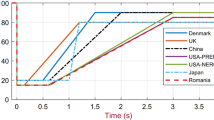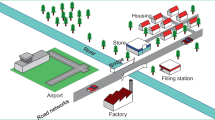Abstract
This paper analyzes the mode provisioning and scheduling, in light of the aggregation over distributed energy storage system for improving the interactions and energy trading decisions under the smart grid networks. Further a new smart power system equipped with energy storage devices yields efficiency and robustness in a novel structure, which can identify and react on the energy market equilibrium in a timely manner. An energy consumption and stochastic linear programming game in the distributed structure is proposed for the energy payments, so that scheduling for appliances and storage devices can be used here as well. Furthermore, it is easy to implement a proposed two-phase DSLPM (distributed stochastic linear programming management) algorithm to bring about optimality with both energy provider and users to approach payoff sharing under uncertainty. With the incomplete information, a price equilibrium scheme is proposed. Experimental results are shown to verify the consumed energy, payment, and convergence properties of the proposed models.





Similar content being viewed by others
References
Farhangi H (2010) The path of the smart grid. IEEE Power Energy Mag 8(1):18–28
Wang W, Xu Y, Khanna M (2011) A survey on the communication architectures in smart grid. Comput Netw 55(15):3604–3629
Kurt S, Yildiz HU, Yigit M et al (2017) Packet size optimization in wireless sensor networks for smart grid applications. IEEE Trans Ind Electron 64(3):2392–2401
Zhao C, He J, Cheng P et al (2017) Consensus-based energy management in smart grid with transmission losses and directed communication. IEEE Trans Smart Grid 8(5):2049–2061
Maharjan S, Zhu Q, Zhang Y, Gjessing S, Basar T (2015) Demand response management in the smart grid in a large population regime. IEEE Trans Smart Grid 7(1):189–199
Tushar W, Bo C, Chau Y, David BS, Kristin LW, Yang Z, Poor HV (2015) Three-party energy management with distributed energy resources in smart grid. IEEE Trans Ind Electron 62(4):2487–2498
Cintuglu MH, Mohammed OA, Akkaya K et al (2017) A survey on smart grid cyber-physical system testbeds. IEEE Commun Surv Tutor 19(1):446–464
Aktas A, Erhan K, Ozdemir S et al (2017) Experimental investigation of a new smart energy management algorithm for a hybrid energy storage system in smart grid applications. Electr Power Syst Res 144:185–196
Li H, Dimitrovski A, Song JB, Han Z, Qian L (2014) Communication infrastructure design in cyber physical systems with applications in smart grids: a hybrid system framework. IEEE Commun Surv Tutor 16(3):1689–1708
Ma J, Deng J, Song L, Han Z (2014) Incentive mechanism for demand side management in smart grid using auction. IEEE Trans Smart Grid 5(3):1379–1388
Shakeri M, Shayestegan M, Abunima H et al (2017) An intelligent system architecture in home energy management systems (HEMS) for efficient demand response in smart grid. Energy Build 138:154–164
Wang K, Du M, Maharjan S et al (2017) Strategic honeypot game model for distributed denial of service attacks in the smart grid. IEEE Trans Smart Grid 8(5):2474–2482
Wang Y, Saad W, Han Z, Poor HV, Başar T (2014) A game-theoretic approach to energy trading in the smart grid. IEEE Trans Smart Grid 5(3):1439–1450
Guo F, Wen C, Mao J, Song YD (2017) Distributed economic dispatch for smart grids with random wind power. IEEE Trans Smart Grid 7(3):1572–1583
Uhan NA (2015) Stochastic linear programming games with concave preferences. Eur J Oper Res 243(2):637–646
Garau M, Celli G, Ghiani E et al (2017) Evaluation of smart grid communication technologies with a co-simulation platform. IEEE Wirel Commun 24(2):42–49
Wang K, Wang Y, Hu X et al (2017) Wireless big data computing in smart grid. IEEE Wirel Commun 24(2):58–64
Liu Y, Yuen C, Huang S, Hassan NU, Wang X, Xie S (2014) Peak-to-average ratio constrained demand-side management with consumer’s preference in residential smart grid. IEEE J Sel Top Signal Process 8(6):1084–1097
Forouzandehmehr N, Han Z, Zheng R (2016) Stochastic dynamic game between hydropower plant and thermal power plant in smart grid networks. IEEE Syst J 10(1):88–96
Vaccaro A, Loia V, Formato G, Wall P, Terzija V (2015) A self-organizing architecture for decentralized smart microgrids synchronization, control, and monitoring. IEEE Trans Ind Inform 11(1):289–298
Nguyen HK, Song JB, Han Z (2014) Distributed demand side management with energy storage in smart grid. IEEE Trans Parallel Distrib Syst 26(12):3346–3357
Polak I, Privault N (2018) A stochastic newsvendor game with dynamic retail prices. J Ind Manag Optim 14(2):731–742
Acknowledgements
The authors acknowledge the National Nature Science Foundation of China (Nos. 61440023, 61202046), China National Petroleum Corporation Creative Research Foundation (No. 2013D-5006-0605) and Discipline Groups Construction Foundation of Food New-type Industrialization of Hubei University of Arts and Science.
Author information
Authors and Affiliations
Corresponding author
Rights and permissions
About this article
Cite this article
Qin, H., Wu, Z. & Wang, M. Demand-side management for smart grid networks using stochastic linear programming game. Neural Comput & Applic 32, 139–149 (2020). https://doi.org/10.1007/s00521-018-3787-4
Received:
Accepted:
Published:
Issue Date:
DOI: https://doi.org/10.1007/s00521-018-3787-4




